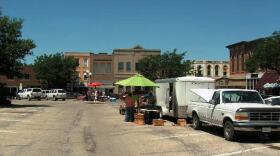Recognizing that the demand for local food is growing to between $5 and 7 billion a year, the USDA announced a new effort aimed at connecting farmers with urban shoppers.
"We know that there are a number of opportunities that exist in urban centers to expand local food production and promotion," Secretary of Agriculture Tom Vilsack said.
That's why certain urban projects will now be eligible for Business and Industry Guaranteed Loans. The loan program has long been a part of the farm bill as a Rural Development program, but it has been previously limited to rural recipients.
Now, Vilsack says a food hub that connects city institutions to local food prodcuers is one example of an urban project that could be eligible.
"If you’re going to be using USDA resources," Vilsack said, "[the project] has to have a connection, a financial and legitimate connection, to rural areas and that is why there is the condition that there has to be some linkage to rural productions and producers."
The market for local food has skyrocketed over the last two decades and USDA priorities reflect that. The $78 million in this year’s farm bill is the biggest ever federal boost to local food programs.
Vilsack said funding local food projects promotes three of his department's goals: expanding market opportunties for small and mid-sized farms, increasing access to nutritious food that has a smaller carbon footprint and creating jobs in rural communities to help grow their economies.











